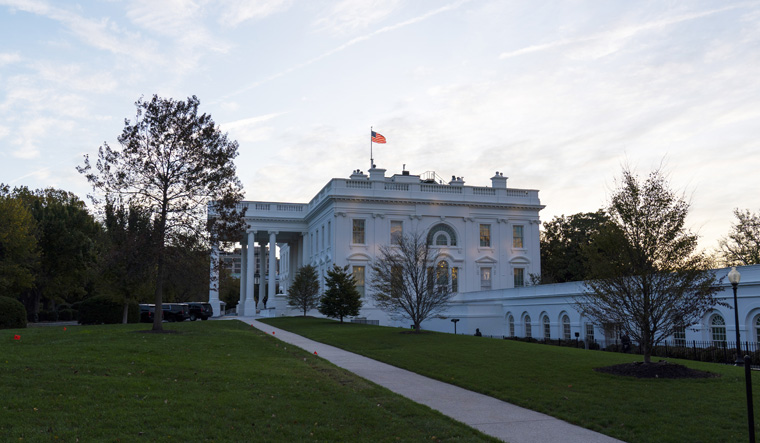A bruising presidential election campaign is over, and voting has nearly wound up across the United States. In this showdown between polarising US President Donald Trump and centrist Democratic challenger Joe Biden, what should we expect as the votes are counted?
When will we get to know the results?
Getting concrete results on the same day might be a hard ask. This is because a record number of US citizens, particularly Democrats, had cast mail-in ballots this year, and counting them could take days. President Donald Trump has repeatedly suggested a slower-than-typical result is a sign of trouble. "I think it is terrible that we can't know the results of an election the night of the election," he said on Sunday. "I think it is a terrible thing when states are allowed to tabulate ballots for a long period of time after the election is over."
But how long could it take? Take the key battleground states for instance. States like Florida, Georgia and North Carolina allow election officials to begin processing mail-in ballots weeks before election day. This means their fates could be decided on the election night in the US (before noon November 4 IST). Similar is the case for Texas, Iowa and Ohio. Most of their ballots could be counted by the end of November 3 night in the US (Wednesday in India).
The case for swing states of Pennsylvania, Arizona, Michigan and Wisconsin are entirely the opposite. Mail-in ballots cannot be counted until election day, and since there has been a surge of postal ballots, the vote counting in those states could last days.
Expect Red and Blue ‘mirages’ and ‘shifts’
What does it mean? Simply put, early trends can be very deceptive. Initial vote tallies from the key states could skew in favour of the Republican ‘Red’ or the Democratic ‘Blue’—in essence, producing mirages—given the massive surge in mail-in ballots. This is a crucial point: The two parties are voting in two very different ways. Democrats have flocked to voting by mail, while Trump has encouraged Republicans to vote on election day. So, the states that count mail-in votes before election day are likely to give Biden an early lead, since opinion polls and early voting data suggest those ballots favour the Democrats. Conversely, the states that do not tally mail-in votes until November 3 will likely swing initially for Trump.
This will result in Red and Blue “mirages” and later seismic “shifts” as more and more votes are counted.
To recap: In states like Florida, Georgia and North Carolina, where mail-in ballots can be processed first, the initial results could skew heavily Democratic. But, when results from election day are counted, the Republican positions could consolidate. Conversely, in states like Pennsylvania, Michigan and Wisconsin, the progression could be the exact opposite. They tally election day votes first, which could result in a heavy Republican wave before the Democrats consolidate when the postal ballots are counted.
Why Florida could decide the election on Wednesday
In Trump’s race for the 270 electoral college votes, swing state Florida’s 29 votes are crucial. And it is a state which will be viewed very carefully on Wednesday, since it can provide a holistic tally as postal ballots can be processed in the state before the polls. If Trump loses Florida, his path to victory is all but shut out. Trump has several paths to 270, but his best route hinges on winning Florida and Pennsylvania. If he wins both states and holds onto North Carolina and Arizona, which he narrowly carried in 2016, and also Georgia and Ohio, which he won in 2016 but is now competitive, he will win.
Right now, exit polls how Biden ahead of Trump in crucial states like Michigan, Wisconsin and Pennsylvania, which the latter had flipped from Hillary Clinton in 2016
Two other battleground states North Carolina and Georgia also can begin processing mail ballots early. They are both considered critical states for Trump.
Chances for legal disputes
Trump has already dropped enough hints that he might not accept the election results. He has already said he will go in for legal measures if things don't go his way. Trump lamented Supreme Court's rulings that allowed for Pennsylvania and North Carolina to count absentee ballots that are postmarked before election day, but arrive shortly after Tuesday. "I think it is a terrible thing when ballots can be collected after an election. I think it is a terrible thing when people or states are allowed to tabulate ballots for a long period of time after the election is over because it can only lead to one thing," Trump said.
"We are going in the night of, as soon as the election is over, we are going in with our lawyers," he said as he criticised the decision taken by the Supreme Court to allow ballots to be received after election day in several battleground states.
Roughly 300 lawsuits already have been filed over the election in dozens of states across the country, many involving changes to normal procedures because of the coronavirus pandemic. Pennsylvania, where the candidates appeared to be divided by a razor-thin margin for the state's 20 electoral votes, seemed likely to be the epicentre of any post-election litigation.
-Inputs from agencies





